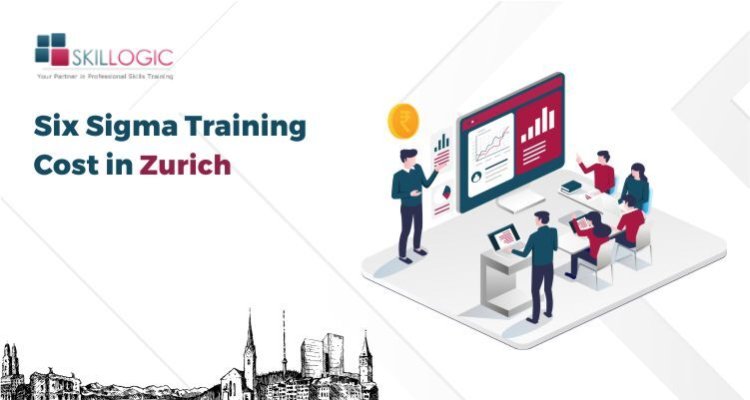How Much is the Six Sigma Training Cost in Zurich?

In today's competitive business environment, organizations are constantly seeking ways to enhance their operational efficiency and improve their bottom line. One approach that has gained significant popularity is the implementation of Six Sigma methodologies. Six Sigma is a data-driven methodology aimed at reducing defects, minimizing process variations, and improving overall quality within an organization.
It has proven to be highly effective in numerous industries, including manufacturing, healthcare, finance, and telecommunications. In this article, we will explore the cost of Six Sigma training in Zurich and delve into the various factors that influence the pricing structure. By gaining insights into the investment required, you can make an informed decision about whether Six Sigma training is the right choice for your organization in Zurich
Is Six Sigma in demand in Zurich?
Six Sigma is a globally recognized methodology for process improvement and quality management, and its demand can vary across different industries and regions. Zurich is known for its commitment to excellence and high-quality standards. Swiss companies are often associated with precision, reliability, and quality products/services. Six Sigma aligns well with this philosophy and can be seen as a valuable tool for achieving and maintaining excellence.
The main objective of six sigma is to enhance manufacturing quality by addressing defects and eliminating errors. According to a Forbes report, Fortune 500 companies have embraced six sigma, expecting to generate a value of $427 billion. However, it's important to note that demand for Six Sigma professionals can also be influenced by market conditions, industry trends, and specific organizational needs. Six Sigma uses an important approach called DMAIC which stands for Define, MEASURE, Analyze, Improve and Control. It is a driven methodology that is used to improve, stabilize and optimise business processes. It's always beneficial to research and monitors the job market in Zurich or consults with local recruitment agencies to gather up-to-date information on the demand for Six Sigma practitioners in the area.
WHAT IS QUALITY
What is the advantage of six sigma professionals in Zurich?
The advantage of having Six Sigma: professionals in Zurich lies in their ability to implement robust methodologies and principles to enhance operational efficiency and drive continuous improvement in organizations. These professionals are equipped with the knowledge and skills to identify and eliminate defects, reduce process variations, and optimize business processes. Six sigma training in Switzerland can help students to gain the six sigma concept for a better learning experience By utilizing their expertise, organizations in Zurich can achieve higher quality standards, improved customer satisfaction, reduced costs, and increased profitability. Six Sigma professionals in Zurich bring a disciplined and data-driven approach to problem-solving, ensuring that organizations can achieve their goals and maintain a competitive edge in the dynamic business landscape of Zurich.
Why Six Sigma certification is essential in Zurich?
Six Sigma Certification in Zurich holds significant importance as it provides professionals with the essential tools and methodologies needed to initiate process improvement and achieve tangible outcomes within organizations. Zurich's status as a prominent business and industrial centre necessitates adherence to superior quality standards and operational efficiency.
With Six Sigma certification, professionals gain the expertise to effectively identify and eradicate defects, minimize waste, streamline processes, and ultimately enhance overall organizational performance. By utilizing the principles and techniques of Six Sigma, certified professionals become invaluable assets to Zurich-based organizations, enabling them to optimize productivity, elevate customer satisfaction, and maximize cost-effectiveness.
What are the different levels of Six Sigma?
Six Sigma is a methodology that focuses on process improvement and reducing variation in business processes. It employs a set of tools and techniques to identify and eliminate defects or errors in a process. Six Sigma utilizes a hierarchical structure to define different levels of expertise and involvement in the implementation of the methodology. The levels of Six Sigma are as follows:
- White Belt: The White Belt level represents an introductory level of Six Sigma knowledge. Individuals with White Belt training have a basic understanding of the Six Sigma concepts and terminologies but may not be actively involved in project teams. They often provide support to more senior Six Sigma practitioners.
- Yellow Belt: Yellow Belt holders have a more comprehensive understanding of Six Sigma principles than White Belts. They are typically team members who actively participate in Six Sigma projects led by Green or Black Belts. Yellow Belts help collect data, analyze basic process metrics, and contribute to problem-solving activities.
- Green Belt: Green Belts are individuals who have received training in Six Sigma methodology and tools. They work on Six Sigma projects part-time while performing their regular job responsibilities. Green Belts play a crucial role in data collection, analysis, and problem-solving activities within their project teams.
- Black Belt: Black Belts are highly trained and experienced individuals who lead and manage Six Sigma projects. They possess a deep understanding of the Six Sigma methodology, statistical tools, and data analysis techniques. Black Belts dedicate the majority of their time to driving process improvements, coaching Green Belts, and mentoring Yellow Belts.
- Master Black Belt: Master Black Belts are experts in the Six Sigma methodology and its implementation. They provide leadership, guidance, and mentorship to Black Belts and Green Belts. Master Black Belts often assist in strategic planning, selecting and scoping projects, and ensuring the successful execution of Six Sigma initiatives across the organization.
In addition to these levels, some organizations may also have Champion roles. Champions are senior executives or managers who provide overall support and guidance to Six Sigma initiatives, aligning them with the organization's goals and strategies. Having a six sigma career in Switzerland is enhancing and the salary of a six sigma black belt professional in Switzerland ranges from CHF 166,000 per year according to a Salary Explorer report.
It's worth noting that the specific roles and level names may vary slightly between organizations, as different companies may have their own variations or adaptations of the Six Sigma methodology.
WHAT IS BUSINESS IMPACT OF IMPROVING QUALITY
Why SKILLOGIC Six Sigma training in Zurich?
SKILLOGIC is a renowned global IT institute that has gained recognition for its exceptional reputation and a wide array of courses. With an impressive portfolio of over 25 accreditations, including esteemed organizations like TUV and ICFQ, SKILLOGIC offers a diverse range of up-to-date courses in various fields such as Project Management, IT Services and Architecture, DevOps, Agile, Quality Management, Business Analytics, and Six Sigma. The Six Sigma course in Zurich provided by SKILLOGIC is highly esteemed and holds accreditation. SKILLOGIC has successfully trained more than 8,000 Six Sigma professionals who possess the skills to effectively implement high-quality frameworks in real-world scenarios. The Six Sigma Certification Training in Zurich is a 12-day online program, with daily sessions lasting 2 hours. SKILLOGIC offers comprehensive combo courses for Six Sigma encompassing both Six Sigam Green Belt certification training, and Six Sigam Black Belt certification training. Noteworthy features of SKILLOGIC's courses include expert trainers, exceptional study materials, practical case studies, and complementary courses in Business Analytics Foundation.
The course feature of the SKILLOGIC Six Sigma training in Zurich is
- Training content is based on the latest six sigma
- Premium access to six sigma resources and the six sigma job portal
- Earn 16 hours of PDU (Training)certificate
- Mock test
- Complimentary 180 days of high-quality e-learning access
- Learn with the best instructor with decades of experience
Read these articles:
- What are the Principles of Quality Management?
- The advantages of Lean Six Sigma
- Role of Quality in Six Sigma
How much does a Six Sigma Course Cost in Zurich?
The cost of Six Sigma courses in Zurich can fluctuate depending on several factors, including the level of certification, the training provider chosen, and the delivery method of the course. Typically, the Cost for Six Sigma Certification Courses in Zurich falls between CHF 2000 and CHF 1000. However, it's important to note that the actual cost may vary depending on the specific training provider and the additional services included in the package, such as training materials, exam fees, and certification expenses.
The business sector has witnessed substantial benefits from implementing Six Sigma methodologies, leading many individuals to pursue career in six sigma field within industry-related organizations. SKILLOGIC offers highly cost-effective Six Sigma Certification Combo Training Cost in Zurich, starting at a competitive price of CHF 1030 for live online training. Students can take advantage of a discounted rate of CHF 639 for the live online training option. Alternatively, for those who prefer a self-learning approach, the course fee begins at CHF 630, and the complete course is available for CHF 379.
The Cost for Six Sigma Green Belt Certification Training in Zurich is CHF 480 for virtual training, with students able to access the course at a discounted price of CHF 289. Alternatively, self-learning options are available for CHF 290, with students having the opportunity to purchase it at a reduced price of CHF 179.
For more information refer these articles:
- How Much is the Six Sigma Training Cost in Switzerland?
- How much is the Six Sigma Certification Training Cost in Malaysia?
- How much is the Six Sigma Certification Training Cost in Australia?
Conclusion
In conclusion, the cost of Six Sigma training in Zurich can vary depending on several factors. The specific training provider, the level of certification sought, the duration of the training program, and any additional services or materials included can all influence the overall cost. While it is difficult to provide an exact figure without specific information, it is important to consider the value and benefits that Six Sigma training can bring to an individual's career or an organization's operational efficiency.
With the rising demand for Six Sigma methodologies in Zurich's business sector, pursuing a career in this field can lead to promising opportunities. By undertaking a Six Sigma training course in Basel, you can acquire the necessary skills and knowledge to meet the high demand for professionals skilled in process improvement and quality management, positioning yourself for a successful career in Zurich.
Six Sigma’s 3 Critical Elements to Customer Satisfaction
Read these articles:

 admin
admin 



